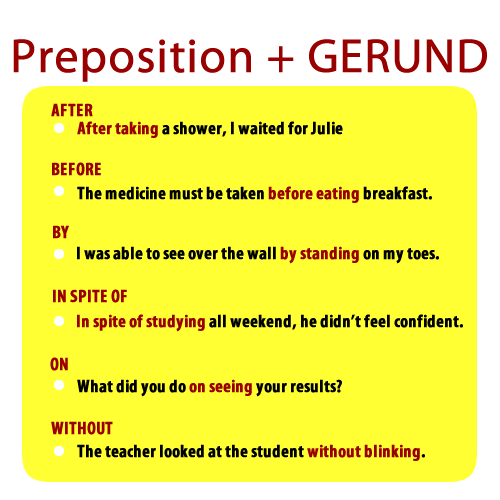Understanding the correct use of prepositions with gerunds is crucial for mastering English grammar. This guide will help you navigate the common combinations, such as “interested in learning” and “good at cooking,” providing clear examples and practical exercises. Learning these patterns can enhance your writing and speaking skills, making your English more fluent and natural. Dive into this resource to strengthen your grammar and improve your ability to construct accurate and effective sentences.

When a verb follows a preposition, the verb must be in the gerund form [verb+ing].
This is a rules that has no exception. A lot of prepositions follow verbs (adjust to, agree with, depend on, etc), and if a second verb follows the prepositions , it MUST be gerund.
Verb + Preposition + Gerund
- adapt to
People need to adapt to changing environmental conditions. - adjust to
The twins had to adjust to living as singles. - agree (with) on
I could not agree on spending more money on the kids. - apologize for
I apologize for interrupting. - approve of
I don’t approve of leaving small children home alone. - argue about/against
You can’t argue about having an extra pair of hands. - ask about
She asked about making another cup of tea. - believe in
I believe in giving peace a chance. - blame for
Who’s to blame for rising food prices? - care about
She doesn’t care about getting into this college. - complain about
Mother complained about being tired. - consist of
Kid’s summers consist of going to the pool or the library. - decide on
Ken decided on going abroad next year. - depend on
I had come to depend on seeing her in my dreams. - disapprove of
Some people disapprove of helping migrants. - discourage from
Teenagers should be discouraged from going into internet chat rooms. - engage in
Students were engaged in learning the new grammar rules. - forgive for
I think Jessica will never forgive for lying. - get used to
I can’t get used to living in such a crowded city. - give up
Oh, I will never give up trying to find him. - help with
Some children require lots of help with reading. - inquire about
He inquired about attending Bob Jones University. - insist on
He insisted on seeing me off at the airport. - interfere with
I’m afraid your dance routine will interfere with studying. - keep on
We need to keep on trying. - look forward to
I look forward to going home next weekend. - object to
I object to changing plans at this late date. - participate in
All students participated in doing pantomimes. - persist in
Some people persist in calling Pluto the ninth planet. - plan on
What do you plan on doing? - prepare for
Instructors vary in how they prepare for teaching a course. - profit from
Henry profited from selling his parents’ house. - prohibit from
We are prohibited from doing lots of things in this school. - put off
Do you ever put off going to a doctor? - succeed in
She’s succeeded in making you jealous, hasn’t she? - suffer from
Doctors say children can suffer from playing video games. - talk about
We talked about going to Italy for our summer vacations. - take part in
Many people took part in bringing the lost child home. - there’s no point in
There is no point in arguing with them. - think about
Jake and Julia think about getting married. - warn about
They warned us about speeding on this road. - work on
Brian really has to work on improving his vocabulary. - worry about
I always worry about losing things.
Can you think of any other examples?
If you have any questions or doubts, please ask in the comments or send me a private message.
Follow me on Instagram: @englishyourwaybr
or look for the hashtag #LearnEnglishWithCarlo
